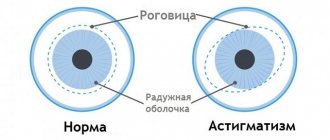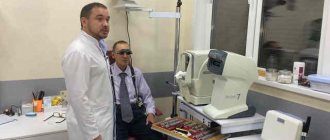Path: Home page › Vitamins and minerals › Vitamins for eyes for children
Vitamins are organic compounds necessary for human life, most of which cannot be produced by the body on its own, but are ingested with food or in the form of specially developed preparations. A long-term lack of these beneficial substances leads to disruptions in the functioning of all organs and systems, and in a child’s body their deficiency provokes retardation in growth, physical and mental development.
Unfortunately, today there are a huge number of problems related to children's health, and one of the most pressing is visual impairment. In civilized countries, about 20% of preschoolers are regular patients of ophthalmologists, and the number of schoolchildren with vision problems increases to 30%! This situation is provoked by various factors, and, in particular, poor-quality nutrition, which does not provide enough necessary organic compounds.
Taking children's eye vitamins allows you to:
- prevent vision loss;
- reduce the manifestations of relevant diseases;
- improve night vision;
- relieve headaches caused by cerebrovascular accidents;
- improve the condition of the mucous membrane, reduce tearfulness.
What vitamins affect vision?
It is usually customary to talk about the complex effects of vitamins on the human body. The lack of one or another substance affects the health of all systems and organs. However, we can also identify those vitamins whose benefits for vision are the highest.
These are retinol (vitamin A), ascorbic acid (vitamin C), tocopherol (vitamin E), B vitamins: thiamine (B1), riboflavin (B2), niacin (B3), pyridoxine (B6), folic acid (B9) and cyanocobalamin (B12).
Vitamin-like substances and microelements play an important role for the full functioning of the visual organs: lutein, calcium, potassium, zinc, magnesium, chromium.
The benefits of vitamin complexes for the eyes
According to statistical studies, in European countries more than 20% of preschoolers are regular patients of an ophthalmologist. A third of schoolchildren's vision gradually deteriorates. This is not a particularly good trend, which indicates both the incorrect organization of the learning process and the incorrect regime of children. Regular intake of vitamin complexes allows you to:
- improve cerebral circulation;
- avoid the development of complex eye diseases in childhood;
- prevent deterioration of visual acuity;
- strengthen night sleep.
Signs of vitamin deficiency
Vitamin deficiency is a fairly common phenomenon even in developed countries, despite the abundance of food on store shelves. It is important to monitor not only the quality of the purchased products, but also their compatibility with each other and the method of preparation. Otherwise, you may not get enough vitamins from food.
Hypovitaminosis can be suspected if the following symptoms appear:
- Impaired twilight vision (hemeralopia, or the familiar “night blindness”), dry mucous membrane of the eye, recurring conjunctivitis. These signs often indicate a lack of vitamin A.
- Fatigue, damage to small blood vessels in the eyes, increased intraocular pressure. May indicate insufficient intake of vitamin C in the body.
- Poor vision in the dark along with a burning and tingling sensation, frequent redness of the eyes. This symptom occurs when there is a lack of riboflavin.
- "Twitching" of the eyelids. This unpleasant symptom can be eliminated by increasing your dietary intake of vitamin B6.
- Feeling of constant eye fatigue. May indicate a deficiency of cyanocobalamin.
When are vitamins prescribed?
As a rule, the lack of substances beneficial for vision can be corrected by changing your diet. But in some cases, the need for vitamins may be higher than the body is able to obtain from food or produce on its own.
For example, with increased visual stress, in spring or autumn, during postoperative recovery. Then the ophthalmologist will prescribe a vitamin complex to prevent visual impairment associated with insufficient intake of nutrients.
Important! Before taking any medications, be sure to consult your doctor!
Children's vitamins to improve vision
To maintain healthy eyes in children, various vitamins are needed, each of which has its own role:
- Retinol is involved in most visual processes. With its participation, a light sensitivity pigment is formed - rhodopsin, without which it is impossible to see in the dark.
- Ascorbic acid is required to normalize blood flow, maintain the tone of the eye muscles, and prevent the development of fatigue.
- Tocopherol normalizes the functioning of membranes, participating in the antioxidant protection of tissues, and prevents retinal detachment.
- Riboflavin, or B2, participates together with vitamin A in the formation of purple and in the normalization of dark adaptation.
- P, or rutin, reduces the fragility of blood vessels and reduces capillary permeability.
- D suppresses inflammatory processes in the retina and cornea.
So, what eye vitamins should a child take? The selection of medications for children must be carried out on the recommendation of an ophthalmologist! With unsystematic use of vitamin complexes for vision, hypervitaminosis may develop. For example, an excess of vitamin A can lead to increased intracranial pressure, decreased appetite, irritability, drowsiness, nausea, liver problems, migraines, etc.
In addition to vitamins, children's eyes require the presence of other substances in the body:
- beta-carotene is provitamin A, transforming into it only in quantities necessary for the body;
- lutein is involved in the preservation of the retina, blocks lens opacification;
- Lycopene protects the choroid of the eye from light damage.
What substances are necessary for vision
Substances necessary for the normal functioning of the visual organs belong to two main groups: vitamins and microelements.
Vitamins
Vitamins of group A:
- Retinol (vitamin A). Improves twilight vision, nourishes the mucous membrane of the eye, prevents inflammation. Contained in products of animal origin (liver, sour cream, yolk, butter). It is synthesized in the large intestine from carotenoids (beta-carotene and lycopene) found in plants. Vegetables and fruits with the highest content of retinol precursors are orange and red in color.
Vitamins and microelements necessary for vision
Almost all vitamins, in one way or another, affect visual acuity.
Be sure to read a useful article by an ophthalmologist about the main causes of decreased vision in children, methods of diagnosis and treatment of these diseases.
Essential vitamins
The main vitamins, the deficiency of which leads to decreased vision function in children, are presented below.
- Vitamin A (retinol) is rightfully considered the main vitamin affecting vision. A lack of this vitamin in the body causes “night blindness” (decreased visual acuity at dusk), frequent inflammatory diseases of the eyelids and leads to worsening myopia. Vitamin A is found in all orange-colored fruits and vegetables, as well as parsley, liver and tomatoes. It should be remembered that vitamin A is a fat-soluble vitamin, so it is best absorbed if you pour vegetable and fruit salads with vegetable oil.
- B vitamins : B1 (thiamine), B2 (riboflavin), B12 (cyanocobalamin) - a group of vitamins, without which the proper functioning of the entire nervous system, including the functioning of the optic nerves, is impossible. The source of these vitamins is wholemeal bread, rice, liver, fish, yeast.
- Vitamin C (ascorbic acid) has a direct effect on the wall of blood vessels, strengthening them. The vitamin is found in black currants, rose hips, parsley, sorrel, and citrus fruits. A form of vitamin C is available in the form of pills or effervescent tablets at the pharmacy.
- Vitamin D (cholecalciferol, ergocalciferol) is a vitamin whose main function is to strengthen eye tissue. Its use is indicated for progressive myopia. The source of this vitamin is directly from the sun's rays (synthesis in the body occurs through tanning), seaweed, oil, fish, and forest mushrooms. A decrease in the production of this vitamin is observed in children in northern regions and in winter, when sunny days are shorter. Fat-soluble and water-soluble forms of vitamin D are available in drops in pharmacies.
Essential microelements
Key microelements and biologically active substances for improving vision are presented below.
- Lutein . A special pigment whose main function is to protect the retina. Its maximum amount is located in the macula (the area of the retina responsible for central vision). Performs two functions: absorbing rays of the blue-violet part of the spectrum and neutralizing oxidizing agents and free radicals. Sources of lutein include spinach, eggs, citrus fruits, corn, carrots, and sweet peppers.
- Omega-3 fatty acids . Their main functions in the human body are the production of tissue hormones eicosanoids, the formation of cell membranes and the creation of energy reserves. The source is sea fish.
- Calcium . A necessary element in strengthening eye tissue. Sources include dairy products, sesame seeds and green vegetables.
- Zinc and selenium . Increases the absorption of vitamin A and stabilizes cell membranes. Source: mussels, oysters, onions and garlic.
- For high visual acuity, potassium, fluorine, PP vitamins, vitamin K and E
Not all vitamins and microelements are easily absorbed in the daily dose that each individual body needs, especially in the winter months. The lack of such important components does not have the best effect and leads to visual impairment in children.
Taking vitamin supplements, especially in winter and spring, helps provide the body with everything it needs and preserves vision.
The development of pharmacology has made it possible for doctors to select vitamin complexes individually for each child, depending on the needs of different age groups.
Products for vision
A balanced diet is an important component of a healthy body. It is necessary that the food contains the maximum amount of nutrients. This way you can have a positive effect on your vision.
Products that are good for the eyes can be divided into 4 main groups:
- Vegetables and greens: - carrots (the main source of vitamin A), - all green vegetables (contain lutein), - pumpkin (rich in carotene), - beets (contains B vitamins, ascorbic acid, tocopherol, manganese, zinc).
- Fruits and berries: - blueberries (in addition to lutein, contain a large amount of vitamins and minerals) - a number of vitamin preparations are produced on its basis, - rose hips and citrus fruits (contain a lot of vitamin C), - apricots (a source of beta-carotene).
- Cereals and cereals . They are a valuable source of B vitamins. Cereals also contain tocopherol.
- Fish and eggs. Rich in protein, lutein and amino acids.
To preserve the greatest benefits, products must be subjected to minimal heat treatment, and whenever possible, vegetables and fruits should be consumed raw.
Good news for sweet lovers: dark chocolate, thanks to its high magnesium content, is also good for vision. However, it should be consumed in small quantities (1-2 slices per day).
Important! When creating a menu, it is important to remember that vitamins have compatibility principles. They can enhance or neutralize each other's effects. For example, carrots will bring maximum benefits if consumed along with fatty dairy products, and leafy vegetables are better absorbed in the presence of vegetable oil.
Features of taking vitamins for the eyes
Preventing any problems is much easier than solving them later. This also applies to the prevention of diseases of the organs of vision, which should include a whole range of measures. The following recommendations must be followed:
- regulate the time spent by the child in front of the computer screen or TV;
- monitor your posture, paying special attention to the distance from the eyes to the book or screen;
- do at least minimal eye exercises;
- provide sufficient lighting levels;
- adjust the child’s diet, add products containing useful components necessary to maintain eye health.
The most difficult thing for residents of megacities is to ensure that the last point is fulfilled, since the quality of products available in supermarkets and markets leaves much to be desired. Long-term storage, pre-sale processing, production conditions - all this contributes to a sharp decrease in the amount of vitamins in food products.
That is why most pediatricians recommend that children take a balanced vitamin and mineral complex for prevention, which supports the body during the period of growth, helps prevent the occurrence and stop the development of various diseases. However, it is not advisable to take any medications without consulting a doctor! Even seemingly harmless substances such as vitamins have their own characteristics of use, and if overdosed, they can lead to negative consequences.
The use of vitamin preparations for children
Sometimes dietary changes do not help cope with hypovitaminosis. In this case, the doctor prescribes vitamins in dosage form.
Useful video
The truth about eye vitamins:
Classification
All vitamin preparations are divided into two large groups depending on the amount of active substances:
- Monocomponent drugs. Contains only one vitamin. In turn, they are divided into two types: - water-soluble (Riboflavin, Nicotinic acid), - fat-soluble (Tocopherol acetate, Retinol acetate).
- Multicomponent drugs . Complexes of vitamins and (or) minerals. There can be several types: - a complex of water-soluble vitamins, - a complex of fat-soluble vitamins, - a complex of water- and fat-soluble vitamins, - preparations containing marco- and (or) microelements, - preparations with components of plant origin.
When should children take ophthalmic vitamins?
Experts recommend taking children's vision vitamins for the following diseases or symptoms:
- myopia and farsightedness;
- drying of the mucous membrane of the eyes, feeling of sand;
- increased lacrimation;
- nervous tic;
- rapid eye fatigue;
- if the cornea becomes dull.
Vitamins are also prescribed when eye strain increases (during exams) or during recovery after surgery. When purchasing the best children's eye vitamins on your own, you should pay attention to age restrictions. Some complexes are designed for children from 3 years of age, some from 6, others from 12. Otherwise, there are no contraindications for use, except for individual reactions.
Vitamins for myopia for children
Take the choice of medication for children with myopia seriously. Today, a lot of information about certain vitamins can be found on the Internet, but you should remember that only a qualified specialist will give you an accurate description and prescription for your disease; do not self-medicate, especially in children.
We recommend you consider the drug:
Lutein Complex No. 30 for children
Today, many different pharmaceutical companies can offer their drugs for myopia. To get the desired result, visit an ophthalmologist and get an exact prescription for treatment. You should not carry out treatment on your own, as this can cause a lot of problems and worsening vision as a result.
It is important to note that consuming the above foods will help stimulate the normal functioning of your vision.
Vitamins for adults
All of the above complexes are perfect for adults. In general, the difference between vitamin complexes for children and adults is that children are developing a visual apparatus and it needs to be formed correctly. In adults, it is impossible to influence the formation.
Vitamins for vision for adults with myopia should have a strengthening and supporting effect. And even the simplest vitamins will help your eyes. Blueberries forte are among the most affordable, but the eyes become more alert, even after such simple vitamins.
Okuwait lutein forte
The main element in this complex is lutein. It helps protect teenagers' eyes from oxidative processes. Helps the eyes filter and reflect blue light and has a powerful antioxidant effect. They are not produced by the body, and a person can obtain such a vitamin exclusively from foods of a certain type or from such vitamin complexes. Visual acuity and resistance to oxidative processes are taken from just such a luteal set. Vitamins for restoring vision in myopia must include such a mineral.
Vitamin A
For our eyes, of course, all vitamins will be useful, but vitamins of group A are a necessary element, the deficiency of which can significantly impair the functions of the eyes.
Vitamin A is necessary for the eye to perceive the colors of the surrounding world. With a deficiency, a person may observe that vision gradually begins to deteriorate. In general, this vitamin is responsible for the normal functioning of the eye and maintains good vision in
Before use, be sure to consult an ophthalmologist
person for a long time.
A deficiency of vitamins A can cause the development of dry cornea. The first symptoms will be redness of the eyes and swelling of the eyelid. You may notice that when your eyes are tired, a large number of red streaks form on the sclera. This means that your body is deficient in this vitamin, so you need to replenish it. To do this, you can use foods rich in this vitamin, but it is best to use vitamin complexes in the form of drops, which over a course of intake can normalize the activity of your eyes.
Diet correction
To get the necessary vitamins and minerals, you should create the right diet, which will include a large amount of natural foods rich in various beneficial substances.
The following elements must be present in a proper diet:
- blueberries, rich in vitamins A, B and C;
- asparagus, which contains antioxidants;
- carrot;
- spinach;
- dairy products;
- fish;
- lean meat, such as turkey or rabbit.
You will have to exclude from your diet foods such as alcohol, fast food, as well as sugar, various baked goods and foods containing a large amount of salt.
The best drugs
When selecting vitamins for the treatment of myopia, you should definitely consult an ophthalmologist. Note that in most cases, myopia is a congenital pathology. The composition of the drug you need may vary significantly depending on the presence of allergies, age, condition and stage of development of the disease. Preparations for myopia must contain the entire multivitamin complex or at least some of the vitamins or elements necessary for eye restoration. Next, we will look at the best vitamins for the eyes.
Keep in mind that vitamins are not a panacea. They will help maintain vision and improve concentration, but nothing more. A truly noticeable effect in this case can be noticed only at a weak stage; with moderate and high degrees of myopia, they are ineffective.
Vitalux Plus
Vitalux plus is a biological additive. Available in the form of capsules, which should be taken with meals and washed down with water. Read about the treatment of progressive myopia in children and adults at this link.
The drug softens the effects of stress, alcohol, and smoking, and, as is known, these factors negatively affect vision.
Active ingredients: Vitamins C and E, zinc, copper, lutein, zeaxanthin. Excipients: fish oil, calcium ascorbate, zinc oxide, gelatin, copper carbonate, calcium ascorbate and much more.
Vitalux is recommended for people in large cities, as it provides complete protection for vision from various adverse environmental influences. The disadvantage is that this drug is prohibited for children under 4 years of age, as well as pregnant and lactating women. Read about lens replacement surgery for astigmatism here.
Lutein complex
Lutein complex is a dietary supplement that must be taken with meals.
The drug is released in tablet form. It helps after surgery, with eye fatigue, for people whose work involves bright light, and much more. Ingredients: Lutein, vitamins C, A and E, blueberry extract, which is very good for vision, copper, zinc, taurine, selenium, beta-carotene and much more.
Contraindicated for those people who are intolerant to elements from the composition of the drug.
Doppelhertz Active
Doppelhertz Active is a drug containing elements to restore vision. Presented in capsule form. This drug, like the previous ones, is a biological food additive, so it can only be taken with meals. This material will tell you about Indian eye drops Ujala.
The course of administration is 1 month, one capsule per day.
The composition contains few elements, and only two are Fish oil, namely salmon and vitamin E.
Contraindicated only if the patient has an intolerance to any element from the composition.
Oksial
Oxial is a drug that is used to moisturize the cornea.
Released in the form of drops. The essence of these drops is that if your eyes are dry or tired, you should put drops on your eyeballs and your eyes will be able to work normally. Active ingredients: boric acid and sodium salt of hyaluronic acid. Auxiliary elements: purified water, oxide, sodium chloride, potassium chloride and many others.
This drug is approved for both children and adults, which is its great advantage over other eye drops.
Riboflavin
Riboflavin is a drug that is released in 4 forms: in the form of dragees, in the form of tablets, in the form of drops and in powder form. The medicine has a large number of indications for use, so it is very common.
The composition of this drug is not large, but on the contrary, it consists of only one element, namely vitamin B.
Taking the drug, course duration, and dosage depend on its release form. This drug has absolutely no side effects, therefore it is allowed for children from the first day of life, which is the main advantage and advantage of this drug, but treatment must be carried out under the strict supervision of a doctor.
Taufon
Taufon are eye drops that help in the fight against myopia, cataracts and glaucoma, and also help with damage to the retina and cornea.
The drug contains: the main active substance called taurine, as well as auxiliary substances such as sodium hydroxide solution, purified water, methyl hydroxybenzoate.
The drug has no contraindications and does not cause adverse reactions.
Super optician
Super optic is a vitamin complex of substances aimed at restoring vision, relieving eye fatigue, and also normalizing the basic functions of human eyes.
The drug is a biological supplement, so it should be taken with meals.
Ingredients: Lutein, zeaxanthin, vitamins A, C and E, as well as zinc, copper, manganese and the entire vitamin B group.
Prohibited for children under 12 years of age, pregnant and lactating women. Super optic does not cause any side effects, except in cases where the patient is hypersensitive to the components of the composition. Find out about drops to improve vision for myopia here.
Systane Ultra
Eye drops designed to moisturize the cornea, to reduce eye irritation caused by various factors, and also for people wearing contact lenses.
The drug contains sodium chloride, boric acid, sorbitol, polyquad, potassium chloride, polyethylene glycol and others. Contraindicated in case of hypersensitivity to the components of the composition, as well as in children under 12-14 years of age. The drug, according to patient reviews, is very effective and copes well with the task assigned to it, the cornea is moisturized, dryness in the eyes is reduced to the limit and eye fatigue is not so severe.
You cannot choose drugs only on the recommendation of friends or after reading any articles on the Internet, regarding any drug, the patient must consult a doctor, and only then begin a course of treatment.
Vitamins for children
In most cases, eye medications are designed for children, but there are also special children's multivitamin complexes to combat myopia, which very often affects pediatric patients.
Children's eyes endure a huge load during the day, because children draw, read, and do homework on the computer, which is a great challenge for the eyes of even an adult. It is possible to cure childhood myopia if you undergo a full course of treatment, which will include a multivitamin complex, proper nutrition, daily eye exercises, and the use of special glasses. This article will tell you about Oftan Katahrom eye drops.
The main vitamin that a child should take in large quantities is vitamin A, which has a positive effect on the development of the retina.
If a child has the first symptoms of myopia, do not hesitate, you need to immediately begin comprehensive treatment so as not to start the disease.
What drugs are there?
Vitamin compounds are included in directly drinking vitamin preparations, and also often
are a component of eye drops.
For young children, there are multivitamin complexes that also contain components that are beneficial for vision.
For older children (from 12, in some cases from 6 years old) and adults, tablet preparations for the eyes are used, which most often also include substances such as lutein, zeaxanthin, as well as mineral complexes: copper, zinc, selenium .
Vitamin B1
The second, no less important vitamin for human eyes is vitamin B1. It is necessary for the normal functioning of nervous processes in the eyeball. The retina of the eye contains a large number of nerve endings, so vitamin B1 is necessary to ensure normal metabolism in all its retinal cells. This is necessary for the functioning of the eye and good vision.
In case of vitamin B1 deficiency, there is a significant decrease in the sensitivity of the eye, and the speed of reaction to nerve signals that come from the brain may decrease. All this leads to the fact that the eyes begin to quickly get tired, dryness and redness are observed, the person himself becomes irritable, and his level of performance decreases. If you do not begin to compensate for the deficiency of vitamin B1, this can lead to the development of glaucoma and dystrophy of the pupil of the eye.
Read: Removal of baby teeth
Eyes are an important element of human life, so it is necessary to instill care for your vision from early childhood. It is necessary to regularly give your eyes rest during intense work and saturate them with necessary vitamins and minerals.
Why your eyes hurt and how to improve your vision, a specialist will tell you in the video:
May 23, 2015 Yuki 459
Share this post
We recommend reading along with this article
- Choosing a complex of vitamins by age for children
- Homeopathic nasal drops for children - proven and effective
- Children's Nurofen: instructions for use
- Hilak Forte: course of treatment of dysbiosis and constipation in adults and children
- How to make a children's room with a unique and inimitable design
- How often can you take B vitamins: pros and cons
- What is Ascorutin, indications for use, contraindications,…
- Throat spray for children up to one year: assortment
- Maltofer tablets: instructions for use











